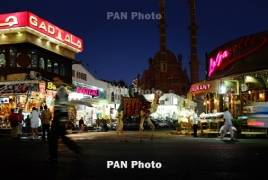Cairo removes Ottoman name amid Egypt-Turkey strife: Al-Monitor February 24, 2018 - 10:57 AMT PanARMENIAN.Net - Cairo Gov. Atef Abdel Hamid announced Feb. 6 that the city will rename Selim I Street in eastern Cairo's El Zaytoun district. The new name is yet unknown, but it is unlikely to be that of another Ottoman sultan, Al-masdar News says. Selim I was the ninth ruler of the Ottoman Empire and the 74th Caliph of Islam who conquered Egypt in 1517 in the battle of Ridaniya. Also called Selim the Grim, he was known as much for his military success as for his rage that spared neither his ministers nor the residents of the cities he conquered. It is believed that the street was named between 1805 and 1848, during the rule of Muhammad Ali Pasha, who decreed that streets would take rulers' names. The decision to rename the street came about after Mohammad Sabri ad-Dali, a professor of contemporary history at the Helwan University in Cairo, wrote a report about the problem and demanded a change from the governor's office. Dali said that it was not right to name a street after a man who conquered Egypt and left it a province of the Ottoman Empire for 400 years, killing thousands of Egyptians defending their land. Selim I also executed the last Memluk sultan, Tuman Bay, and dissolved the Egyptian army. Maj. Gen. Hesham Abdel Hamid, the head of El Zaytoun, is currently holding community discussions with residents, intellectuals and historians to choose a new name. Assem ad-Dassouki, a professor of contemporary history at the Faculty of Arts in Helwan University, said, “The decision is intended to correct the mistake, a common one, of naming streets and squares after conquerors who invaded the country and killed its people. There is a great difference between Selim I and Amr ibn al-'As, who led the first Muslim Conquest of Egypt in A.D. 640 and fought the Byzantine Empire but did not kill Egyptians.” He added, “Egypt’s claims that Selim I is a murderer aren’t recent. In fact, Egyptian historian Muhammad ibn Iyas, who covered the period between A.D. 901 and A.D. 928 in his history book “Badai Alzuhur Fi Wakayi Alduhur” ["The Beautiful Flowers About the Events of the Times"], wrote about the atrocities committed by Selim I when his soldiers fought Egyptians and Memluks in mosques. Selim I’s men killed these people, and they even threw Egyptians from minarets. How can we possibly immortalize the name of such a tyrant?” Dassouki noted that there are no objections to the name because of Selim I's foreign provenance. He maintained there is no problem with naming streets and squares for foreign figures who served humanity, such as French doctor Antoine Clot, who established the Kasr al-Aini School of Medicine in 1828. He called for a wider reassessment of street names and squares in Egypt, where chaos reigns and names run rampant. But for Karam Saad, a researcher on Turkish affairs at the Al-Ahram Center for Political and Strategic Studies, the decision is emblematic of the strained ties between the two countries. Saad said, “This decision cannot be separated from the situation of Egyptian-Turkish relations since 2013, after the Muslim Brotherhood was toppled and Abdel Fattah al-Sisi took over. Turkey considered this change a military coup, and it still insists on this description. As a result, diplomatic representation between the two countries witnessed a setback, with the two countries withdrawing ambassadors and keeping the diplomatic ties at charges d’affaires level. The economic relations also deteriorated between the two countries, and political tensions escalated. Egypt, for instance, recognized the Armenian Genocide three years ago and objected to Turkey’s military operation in Syria.” Authorities said a total of 192 Azerbaijani troops were killed and 511 were wounded during Azerbaijan’s offensive. In 2023, the Azerbaijani government will increase the country’s defense budget by more than 1.1 billion manats ($650 million). The bill, published on Monday, is designed to "eliminate the shortcomings of an unreasonably broad interpretation of the key concept of "compatriot". The earthquake caused a temporary blackout, damaged many buildings and closed a number of rural roads. Partner news |